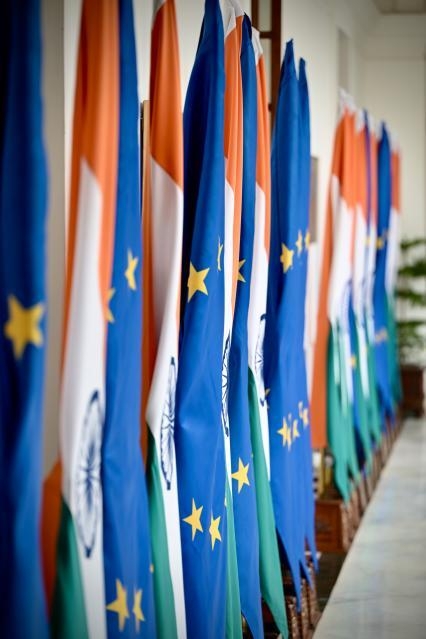City of London and NITI Aayog urge investor-first approach to unlock global capital for India’s sustainable growth
India must attract an estimated $4.5 trillion in infrastructure investment by 2030 if it is to keep pace with rapid urbanisation, a burgeoning middle class and its soaring economic ambitions, according to a joint UK-India finance initiative.
The UK-India Infrastructure Financing Bridge (UKIIFB), co-chaired by the City of London Corporation and India’s NITI Aayog, has released its first annual report outlining a roadmap to close the funding gap and turn global interest into tangible investment. The recommendations centre on making Indian infrastructure projects more appealing to international financiers through greater transparency, global alignment and a sharper investor focus.
India, now the world’s fourth-largest economy and projected to be the fastest-growing major economy, faces a decisive moment. With demand for new transport networks, urban housing, renewable energy and digital connectivity outstripping current capacity, the scale of investment required dwarfs what can be achieved through domestic sources alone. Mobilising foreign capital, the report argues, will be essential to meeting these targets while ensuring growth is sustainable.
The UKIIFB’s steering board has spent the past year consulting on flagship projects including national highways and regional rapid transit schemes. Its report identifies four main areas for reform: adopting an investor-centric approach, aligning projects with international standards, enhancing transparency and risk management, and fostering a more robust ecosystem for project finance.
The investor-centric approach calls for Indian authorities to view projects through the lens of global capital markets. By recognising investor priorities around risk, value and returns—and addressing outdated perceptions of complexity or unpredictability in the sector—the report suggests India can unlock new pools of international funding.
Aligning with global frameworks is another central plank. The report notes that projects adhering to recognised environmental, social and governance (ESG) principles and international accounting standards are far more likely to attract capital from pension funds, sovereign wealth funds and private equity houses seeking stable, long-term returns.
Equally important is investor confidence. The UKIIFB stresses that predictable regulation, transparent bidding processes and robust dispute resolution mechanisms must become standard practice if India is to draw sustained interest. Finally, fostering a competitive ecosystem by building stronger ties with local industry, financial institutions and international advisors is seen as vital to bridging knowledge gaps and ensuring efficient delivery.
Chris Hayward, Policy Chairman of the City of London Corporation, said the findings underscore the scale of opportunity.
“Led jointly by the City of London Corporation and NITI Aayog, the UKIIFB is playing a vital role in mobilising capital for India’s critical infrastructure,” he said. “This report makes a powerful case for action, outlining practical steps to make Indian infrastructure projects more attractive to global investors. At its heart, the findings highlight a clear truth: international investors need clarity, confidence and consistency – and India’s growth ambitions deserve a financing model that matches their scale.”
BVR Subrahmanyam, Chief Executive of NITI Aayog and Co-Chair of the UKIIFB, emphasised the strategic importance of the partnership.
“The transformative UK-India Infrastructure Bridge, jointly steered by India’s visionary policy think tank NITI Aayog and the historic City of London Corporation, is unlocking vast international capital for India’s infrastructure revolution,” he said. “This landmark partnership draws on India’s unmatched capacity for high-growth, sustainable ventures and aligns it with the UK’s proven skills in project finance and strategic execution. Together, we are crafting a robust framework to accelerate India’s ambitious goals in smart cities, renewable energy and connectivity.”
The report positions the UK-India collaboration as more than a financial arrangement. It highlights shared commitments to green growth, energy transition and sustainable urbanisation as areas where both countries’ expertise can converge. The UK’s long-standing reputation in structuring complex international finance deals, combined with India’s scale and demand, is framed as a natural fit.
Observers note that India’s infrastructure push is inseparable from its wider economic trajectory. By 2030, hundreds of millions more people are expected to live in Indian cities, and electricity demand could more than double. Efficient transport corridors, climate-resilient housing, expanded renewable generation and upgraded logistics will all be essential to sustaining growth while meeting climate targets.
While the $4.5 trillion figure may appear daunting, UKIIFB leaders insist the capital exists globally and that India’s challenge is to position itself as a destination of choice. Doing so will require structural reforms, consistent policy signals and credible frameworks that can withstand political and economic cycles.
The recommendations come at a time when investors are increasingly seeking opportunities in emerging markets, but remain cautious about risks such as regulatory uncertainty, currency volatility and long project gestation periods. By addressing these concerns head-on, the report argues, India can transform interest into action and secure the capital required to sustain its rise as a global powerhouse.
The UK-India Infrastructure Financing Bridge is expected to play an ongoing role in monitoring progress, sharing best practice and convening stakeholders on both sides. Its inaugural report sets an ambitious tone: India’s infrastructure revolution, it insists, is both inevitable and investable—if international capital is placed at the heart of strategy.














